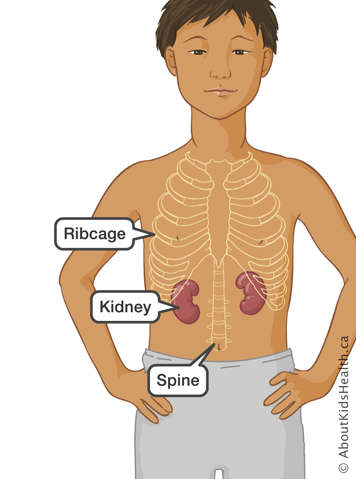
The kidneys are important organs in our bodies. They help to keep us healthy in many ways.
- They take waste products, such as urea and creatinine, away from the body.
- They control the water balance in the body.
- They control the balance of other substances in the body, such as sodium and potassium.
- They help make red blood cells.
- They help bones grow.
Most people have two kidneys, one on each side of the spine, just under the rib cage. They are red-brown in colour and about the size of your child's fist.
What happens when kidneys fail?
When your child has kidney failure, their kidneys stop working normally. This can lead to a build-up of unwanted substances in the blood.
Build-up of urea
The body produces urea when it breaks down or uses proteins. Urea is a waste product, so healthy kidneys remove it through urine (pee). When the kidneys are not healthy, however, the urea builds up in the blood, leading to a condition known as uremia.
If your child has uremia, they might:
- urinate (pee) very little or not urinate at all
- not be hungry
- feel tired
- feel cranky.
Build-up of other chemicals
Usually, healthy kidneys break down and remove excess sodium, potassium, calcium and phosphorus from the body. When kidneys are failing, however, these substances build up in the blood.
Puffiness in the feet, hands and eyes
This type of puffiness is called edema. It occurs when fluid builds up in the body because the kidneys make less urine.
Pale skin
Red blood cells contain hemoglobin, which carries oxygen to all parts of the body. Kidneys help make red blood cells, but when the kidneys do not work very well, they do not make the cells quickly enough. This causes your child to become pale and have less energy.
Headache and irritability
Your child might become irritable if they have a build-up of urea or if they have hypertension (high blood pressure). Blood pressure rises either because of the extra fluid in your child's body or because of a hormone called renin. The kidneys make renin when they do not get enough oxygen from the blood.
Treatments for kidney failure
Kidney failure cannot be cured, but it can be treated. Treatment options include:
- transplant
- dialysis.
Kidney transplant
- This involves surgery (an operation) to place a healthy kidney from a donor into your child's body.
- A kidney can come from a living donor or a deceased donor who is a match for your child. If a child is waiting for a kidney from a deceased donor, they go on a transplant waiting list.
- When your child receives a new kidney, they will need to take medications every day to suppress, or weaken, their immune system so that they do not reject it.
Dialysis
Patients and families can choose between two types of dialysis:
- hemodialysis
- peritoneal dialysis.
It is important to learn the facts about each type of dialysis before choosing one. You will also need to consider if you want to do the dialysis at the hospital or in the comfort of your own home. Keep in mind that your child may need to change from one kind of dialysis to another, depending on their health.
Hemodialysis
There are two types of hemodialysis: home hemodialysis (HHD) and in-hospital hemodialysis.
Home hemodialysis:
- uses a vascular access (a thin tube inserted in a vein) to clean your child's blood
- is a slow, gentle treatment that improves your child's appetite and energy levels
- requires your child to take fewer medications (compared with in-hospital dialysis)
- allows your child to have a wider range of foods and drinks.
In-hospital hemodialysis:
- is offered and monitored by qualified health-care professionals
- is done in a clean, friendly and supportive environment
- gives your child the chance to meet other patients.
Peritoneal dialysis
- Peritoneal dialysis (PD) uses a thin tube called a catheter and the inner membrane (lining) of the abdomen to clean the blood.
- PD offers flexible, easy treatments at home, where you or your child can manage the care.
- PD may help preserve remaining kidney function.
Choosing the treatment option that suits best
It is important to learn about kidney disease and how to manage it. This will help you decide what treatment matches your lifestyle.
For extra guidance, why not try out this decision-making tool from Ottawa Hospital Research Institute. It is designed to guide people through any health-related or social decision and may help you choose which treatment is best for you and your child.
Being active members of the kidney care team
Remember, you and your child are the most important members of your child's nephrology (kidney care) team. The nephrology team will support and guide you to gain confidence to manage your child's kidney disease.
Your commitment to the treatment and your positive attitude will result in better outcomes for your child's health. Staying active and encouraging a healthy lifestyle are also essential for the long-term success of your child's treatment.
Finding out more about treatment options
You can find out more about the different treatment options on the following pages.